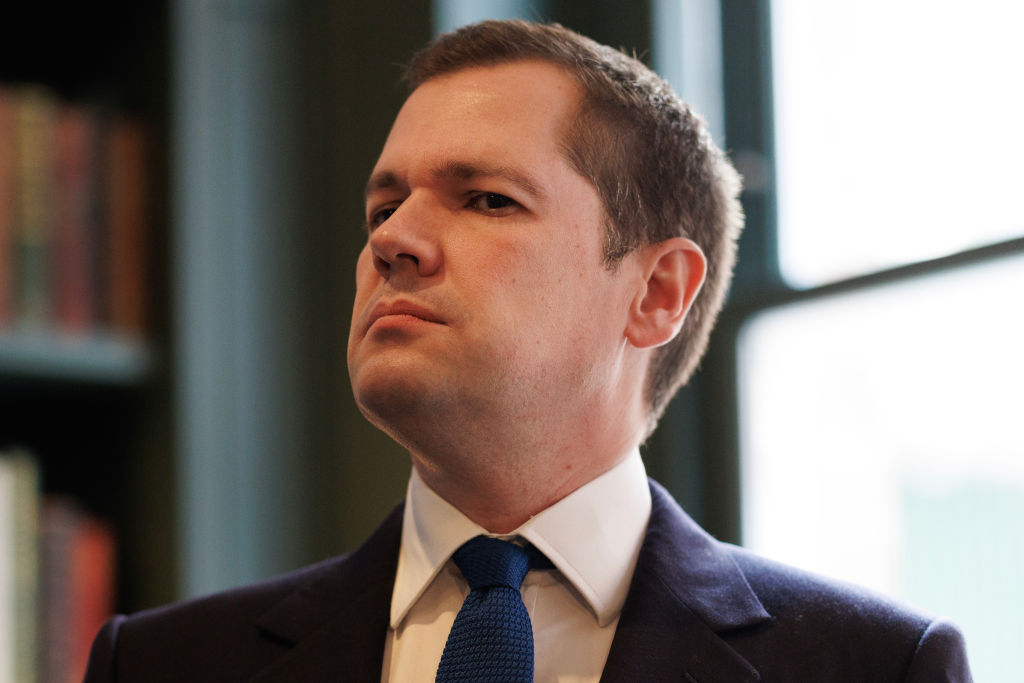When Kemi Badenoch took to the floor during GB News’s TV Q&A on Thursday evening, the atmosphere in the room climbed a notch. Robert Jenrick had just finished his pitch to the party and handled questions well, but it was clear even before the audience rated their leadership candidates that it was Badenoch the majority were there to see. While Jenrick’s ECHR rhetoric received applause, almost every sentence of his rival’s opening pitch was met with cheers. If the audience was representative of the wider Tory membership, Badenoch is on track for an easy win in the leadership race.
Well-known for her direct and often combative approach, Badenoch’s unification pitch seems at odds with her personal style
‘I don’t think this is representative of the Conservative party at large,’ Jacob Rees-Mogg remarked after the event. ‘It was very interesting that the audience basically hadn’t changed its mind. It’s essentially a London audience. A number were from the Cities of London and Westminster, which I was chairman of so this association I know very well, but it’s not your typical Conservative association.’ The former Tory MP – who has been promised the party chairmanship if Jenrick wins – lauded his candidate’s policy plan, after the leadership contender spent much of the evening going in hard on immigration (on which he wants a cap) and the ECHR (which he wants to leave). Jenrick certainly had the room with him most on this issue, telling the crowd: ‘If we don’t detain and deport people within days, we’ll never be able to stop the boats.’ Recounting his time at the Home Office, Jenrick admitted: ‘I saw things that made me angry.’ It’s necessary to set out policy even at this stage, the Jenrick camp believes, as their man is trying to convince members he has the vision it takes to be a prime minister rather than merely leader of the opposition.
Badenoch doesn’t quite agree. The leadership contender pitched herself as the ‘values’ candidate and the former business secretary believes the Tory membership wants first to see an end to party infighting before any kind of decisive policy plan is laid out. The competition is between ‘a re-engineering society versus a sound bite for society,’ one of her backers, David Davis MP, insisted. ‘We’ve got clear principles,’ he added. ‘We know what we stand for, just as we knew what Margaret Thatcher was for.’ The UK’s first female prime minister is a key source of inspiration to Badenoch – ‘What did Margaret Thatcher do?’ was a regular refrain from her spinners during the evening – and as such she will be pleased to read that one of Thatcher’s former colleagues Lord Forsyth has written in today’s Telegraph he sees in the leadership hopeful ‘some of the qualities that enabled Margaret to transform our party’.
Well-known for her direct and often combative approach, Badenoch’s unification pitch seems at odds with her personal style, however. She was quick to brush off allegations of bullying after GB News’s Christopher Hope quizzed her on rifts with former co-workers, laughing, ‘I don’t know how many of you believe what you read in the Guardian.’ Yet could her ‘cut through the crap’ mantra backfire when trying to bring the party together in practice? ‘Picking a fight is not necessarily wrong, depending on who you pick the fight with,’ Davis remarked. ‘There are two criteria for the future leader. One is to be combative enough to be able to destroy Keir Starmer at the dispatch box, on the one hand. And on the other hand, to be cerebral enough to be able to redesign the policies we need to bring to government.’ Indeed Rees-Mogg couldn’t disagree that his man’s competitor would be good fun in the Commons, noting: ‘Kemi is undoubtedly charismatic – and PMQs would be fun. Starmer would have nowhere to hide because it would be even better than William Hague against Tony Blair. But William Hague versus Tony Blair didn’t win us any votes.’
If Thursday night’s head-to-head revealed anything, it is that this leadership race boils down to a tussle over policy versus principles. The audience questions were sufficiently broad that both candidates were able to remain on comfortable ground, reiterating previously made points with Jenrick most at home on immigration and housing and his rival going in heavy on the UK’s ‘broken’ system. The question for Tory members now is whether they can ‘trust’ Badenoch, as she asked the crowd to do, to better the fortunes of her party without offering more clarify on specific policy areas – or whether a clear-cut agenda is more reassuring, as Jenrick has tried to put forward. With just over a fortnight to go, it is he who needs to change minds.
Listen to Coffee House Shots, The Spectator’s daily politics podcast:








Comments